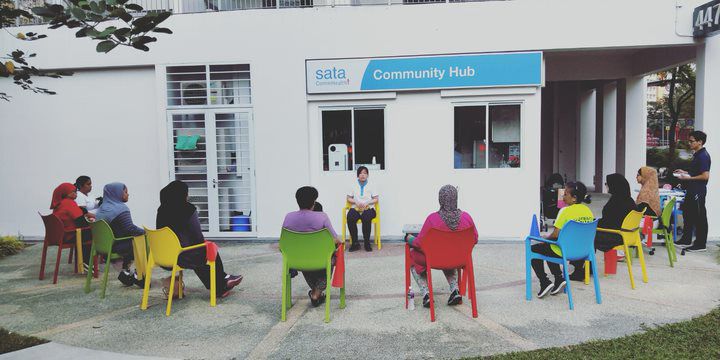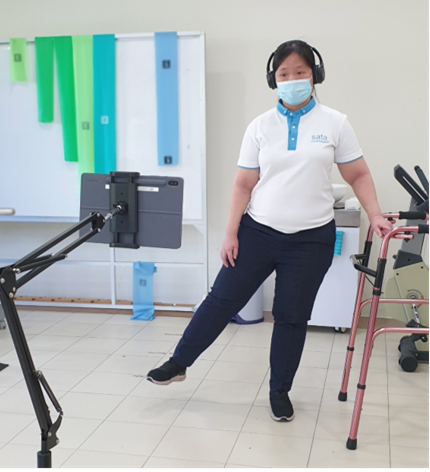Career Diaries: What it’s Like Being a Physiotherapist in Singapore

Name: Zoe Ang Xue Yi
Occupation: Senior Physiotherapist at SATA CommHealth
Age: 32
Years in profession: 10 years
Years in current organisation: 2 years 8 months
Top 3 skills: Teamwork, observation skills, resilience
Best lesson learned on the job: Never be restricted by what you think that you cannot achieve.
Why did you become a Physiotherapist?
It was by chance that I came across the Allied Health booth during a Nanyang Polytechnic open house when I was deciding on my academic progression of choice after A levels. I have always been interested in working in the biology and healthcare sectors. The idea of working to help people regain their mobility after an injury (accident) or stroke appealed to me. Hence, I signed up for the Diploma in Physiotherapy and have been working as physiotherapist ever since.
What made you stay in the sector?
It is the job satisfaction derived from seeing patients improve in their mobility functions day by day, getting re-integrated back to their life and being able to achieve their respective goals.
Growing up, what did you want to be?
I had different job aspiration growing up. I was always interested in biology and wanted to work in the Life science or Health Science field. However, I was more interested in working with people rather than in a laboratory, which is why I chose Health Science instead.
What are some of the reactions you usually get when you tell people what you do?
They would usually ask for advice about a certain body ache that they have and ways to resolve those issues.
How would you describe your job to someone who has never heard of it?
Physiotherapists are Allied Health professionals who employs non-pharmacological strategies for the management of issues with the physical body. We have a diverse range of disciplines and work with patients from all works of life, ranging from pediatrics to palliative patients. We predominantly prescribe exercises to patients to improve in their physical function in various aspects (muscle strengthening to balance). Our main goal is to help restore a patient’s function after an injury or disease by empowering them with the skillset and the knowledge to self-manage their symptoms and exercises.
What are the expectations of being a Physiotherapist?
Key qualities of a Physiotherapist include being analytical, having good time management, having good interpersonal skills, being approachable and tolerant, being a team-player and good communication skills.
Physiotherapists are also expected to have a relatively good physical health to keep up with the physical demands of the job and to observe good biomechanics to prevent work-related injuries.
What is the best thing about being a Physiotherapist?
Having the job satisfaction that you have helped improve a person’s life in small and simple ways.
My day differs on a daily basis, depending on my work responsibilities for the day.
6.30am – I wake up and get ready for work. I would have breakfast before leaving for work. While having breakfast, I would usually scroll through my calendar to remind myself about my appointments and plan for the day.
8.20am – I arrive at work. I would typically arrive at work 10 minutes earlier, especially on my clinical days. On my clinical days, I would look through the patient load for the day, take note of the patients who are due for re-assessments (due to MOH criteria) and list down the things that I have to prepare for each patient. On other days, I would either be setting up the environment for group classes or approaching a patient’s home for a home therapy session.

On my non-clinical days, I would be scrolling through my emails and have a list of tasks to be completed for the day.
1pm – I usually have lunch at 1pm. Due to COVID-19, I would usually buy lunch and dine in the clinic/centre. During this time, I would usually chat with my colleagues to destress or recharge for the afternoon. Sometimes, I also use this time to complete patient documentation that I didn’t manage to complete in the morning.
2pm - 5pm – Depending on the work responsibilities for the day, I would be either attending to patients, doing documentations, having meetings, or be doing administrative work. Currently, my afternoons are typically spent on administrative work to prepare SATA CommHealth for the OneRehab project. OneRehab is a nation-wide project aimed at encouraging clients to perform their rehabilitation sessions in the community setting instead of restructured hospitals. Currently, preparation work includes the purchase of suitable equipment (arranging and attending product demo sessions), getting the team familiarised with the OneRehab related outcome measures, upskilling of rehab staff (both TAs and therapist) and reviewing charges of therapy sessions.

6pm – At this time, I usually get ready to go home. But before I leave, I ensuring things are in place (aircon switched off, lights switched off, hydrocollator power switched off and doors are locked).
8pm – I have dinner and wind down for the day. After dinner, I usually indulge in watching dramas or videos online.
